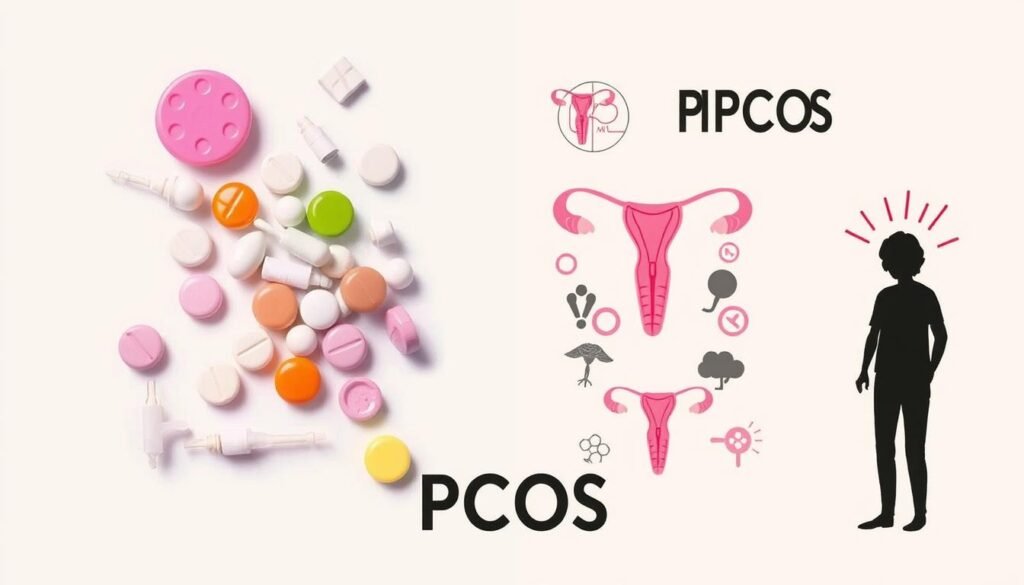Did you know that about 8% to 13% of women face polycystic ovary syndrome (PCOS) during their fertile years? This fact leads to many myths, like the idea that birth control might cause PCOS. However, hormonal birth control is more often used to manage PCOS symptoms. Most women with PCOS, around 70%, have the insulin-resistant type. So, knowing how birth control and PCOS interact is key for making smart health decisions.
The question of whether birth control causes PCOS is complicated. Since PCOS can start developing after puberty and might take years to diagnose, it’s important to understand these connections. This article explains how hormonal birth control helps with PCOS and talks about the risks related to taking birth control.
Key Takeaways
- PCOS affects 8% to 13% of women in their reproductive years.
- Insulin-resistant PCOS is the most common type, making up about 70% of cases.
- Birth control pills are primarily used to help regulate menstrual cycles in those with PCOS.
- It can take months for the body to readjust hormone levels after stopping birth control.
- Misconceptions about birth control leading to PCOS are widespread but often unfounded.
- PCOS symptoms include irregular periods and acne, among others.
Understanding PCOS: An Overview
Polycystic ovary syndrome, commonly known as PCOS, is a hormonal disorder. It impacts many women of reproductive age. Recognizing the symptoms is crucial for managing it effectively.
What is Polycystic Ovary Syndrome?
PCOS involves hormonal imbalances leading to several health problems. Women with PCOS may have irregular periods, high androgen levels, and ovarian cysts. They often gain weight, especially around the belly.
Moreover, PCOS can affect emotional health. It leads to higher rates of anxiety and depression.
Prevalence and Diagnosis of PCOS
About 5 to 10 percent of females worldwide have PCOS. However, many don’t know they have it. Studies show that up to 70% of those affected are undiagnosed.
Diagnosing PCOS usually requires assessing symptoms and conducting ultrasounds and blood tests. Early detection and ongoing care are key to managing its health risks.
Educating people about PCOS is crucial due to its long-term health threats. This includes risks like diabetes and heart problems. Lifestyle changes and medical help can greatly improve affected individuals’ lives.
Hormonal Imbalance and its Impact on Health
Hormones are vital for women’s health, influencing menstrual cycles, metabolism, and well-being. An imbalance can lead to various symptoms, affecting daily life. It’s key to spot these signs early for the right medical advice.
Importance of Hormones in Women’s Health
Estrogen, progesterone, and androgens are crucial for the body. Their imbalance can cause issues like polycystic ovary syndrome (PCOS), affecting reproduction and leading to insulin resistance and obesity. Knowing their roles helps manage women’s health effectively.
Symptoms of Hormonal Imbalance
Spotting symptoms of hormonal imbalance early is important. These signs include:
- Irregular menstrual cycles
- Unexplained weight changes
- Acne or skin shifts
- Hair thinning or growth in unwanted places
- Mood swings, anxiety, and depression
PCOS shows up with missing ovulation, high androgen levels, and ovarian cysts. About 5 to 10 percent of women are affected, often realizing it during fertility issues. Understanding these signs is crucial for long-term health.

If symptoms last, seeing a healthcare provider is wise. They can offer advice and treatments that suit each person’s needs.
Can Birth Control Cause PCOS? Debunking the Myth
It’s important to understand how birth control and Polycystic Ovary Syndrome (PCOS) are linked. This clears up many wrong ideas about birth control. Some people think that birth control pills can cause PCOS. But, science doesn’t back this up. In fact, birth control is often used to help with PCOS symptoms.
The Science Behind Hormonal Contraceptives
Hormonal contraceptives keep hormone levels in check. For those with PCOS, this can mean fewer issues like irregular periods and acne. Studies show that these contraceptives don’t cause PCOS. They help manage its symptoms instead. This is vital since 8–13% of women of childbearing age have PCOS.
About many don’t even know they have it. Also, birth control can lower testosterone levels. This makes periods more regular for those with PCOS.

Misconceptions About Birth Control and PCOS
There are many myths about birth control out there. One is that birth control can fix PCOS. But it only helps manage the symptoms. Hormonal contraceptives balance hormone levels. However, they don’t get rid of PCOS entirely. Another myth is that women with PCOS can’t have babies naturally. But many can, especially with healthy lifestyle changes. Knowing the truth helps people have better talks with their doctors about PCOS and birth control.
To learn more about hormonal imbalances and women’s health, visit this link.
How Birth Control Pills Affect Menstrual Cycles
Birth control pills help in regulating periods and tackling hormonal imbalances. This leads to more predictable menstrual cycles, which is a big plus for many women. They can ease symptoms of polycystic ovary syndrome (PCOS) and give needed hormonal support.
Regulation of Periods Through Hormonal Birth Control
Birth control pills work by stopping the release of luteinizing hormone (LH). This helps decrease the production of androgens by the ovaries. Androgens can cause irregular periods and other symptoms of PCOS.
Many women see improvement in menstrual irregularities with combined oral contraceptives (COC). These are often suggested as the top choice for dealing with PCOS issues.
Post-Birth Control Syndrome: What to Expect
Some women may face post-birth control syndrome after stopping the pills. This can lead to changes in menstrual cycles and bring back symptoms that were under control. However, these issues often get better within a few months as the body adjusts back.
Being aware of post-birth control syndrome is important. It helps women know what to expect and when to seek help from a doctor.

The Role of Hormonal Contraceptives in Managing PCOS
Hormonal contraceptives help manage PCOS by easing many symptoms. They can make menstrual cycles regular, lower androgen levels, and reduce acne and unwanted hair. Knowing how birth control helps with PCOS is key for many women.
Benefits of Birth Control for PCOS Symptoms
Hormonal contraceptives do more than prevent pregnancy. They’re also a recommended treatment for PCOS by top medical groups. Their benefits include:
- They make menstrual periods more predictable.
- They decrease testosterone, easing symptoms like unwanted hair growth.
- They help with acne, improving skin health for those with PCOS.
- They reduce heavy bleeding and pain during periods, making them easier to manage.
Oral contraceptives are very effective. They greatly lower free testosterone levels. This improves life quality for women with PCOS.
Risks and Considerations with Birth Control Usage
While birth control has many perks, it’s vital to know its risks. Some issues include:
- An increased risk of insulin resistance, especially in PCOS patients.
- Possible weight gain, related to hormonal changes, especially in overweight women.
- A higher chance of blood clots, requiring close monitoring by doctors.
- Changes in metabolic effects, meaning treatments need to be personalized.
Talking with a healthcare provider is essential. This ensures women with PCOS can properly manage their condition. They need to weigh the benefits and risks of using hormonal contraceptives.
Side Effects of Birth Control: What to Look Out For
Hormonal birth control is often chosen by women to manage health issues. It’s vital to know the side effects for making informed choices. We will look into the side effects of birth control pills and their long-term use.
Common Side Effects Associated with Birth Control Pills
Different birth control pills can cause various common side effects. Some side effects often reported include:
- Nausea
- Mood swings
- Weight gain
- Spotting between periods
- Headaches
- Sore breasts
Many forms of birth control, like injections, patches, and IUDs, can cause irregular bleeding. This makes it tricky to tell if the bleeding is from birth control or a condition like PCOS.
Long-term Implications of Birth Control Use
Birth control can provide short-term symptom relief. But, there are long-term effects to think about. For example, extended use of some hormonal contraceptives may raise the risk of blood clots. Combination pills might also cause weight gain, a concern for women with PCOS.
Progestin-only pills have fewer possible side effects. They could be better for women with diabetes or heart disease risks. Talking to a doctor can help find the best option considering birth control side effects.
| Side Effect | Frequency | Long-term Risks |
|---|---|---|
| Nausea | Common | Usually resolves |
| Mood changes | Common | May lead to depression |
| Weight gain | Common | Increases diabetes risk |
| Blood clots | Rare | Serious complications |
| Irregular bleeding | Common | May mask PCOS symptoms |
Weight Gain and Birth Control: Understanding the Connection
Many women need to know how weight gain and birth control are linked. Birth control can change your hormones in many ways. This can affect your weight. Women using birth control might see their weight go up and down. This is especially true for women with PCOS. We’ll talk about how these hormone changes can affect your weight. We’ll also share some tips on how to manage your weight while using birth control.
How Hormonal Changes Affect Weight
Hormonal changes from birth control can impact your metabolism and appetite. This might make you gain weight. For example, these changes can make your body resist insulin. This makes staying at a healthy weight harder. PCOS makes women more likely to get fat around their belly. Too much belly fat can lead to health problems like diabetes and heart disease.
Managing Weight While on Birth Control
To manage weight on birth control, try a few things:
- Eat a diet full of fruits, veggies, whole grains, and lean proteins to fight weight gain.
- Do exercises like walking, running, or strength training to keep a healthy weight.
- Keep an eye on how many calories you eat every day.
- Get advice from doctors to come up with good ways to manage your weight.
- Learn about how different birth controls might make you gain weight so you can choose wisely.
Understanding how hormonal changes affect weight helps you stay in charge of your health. Using these tips, women can handle weight gain and birth control better.
Fertility and Birth Control: The Hidden Dynamics
Understanding how fertility and birth control are linked is key to women’s health. Many women turn to hormonal contraceptives for reasons like cycle regulation and to avoid unwanted pregnancies. It’s crucial to know how these birth control methods affect ovulation and reproductive health.
Impact of Birth Control on Ovulation
Birth control significantly influences ovulation. Hormonal contraceptives mainly stop ovulation, making fertilization less likely. Though effective for pregnancy prevention, this may raise concerns about future fertility. Research shows that ovulatory function usually resumes quickly after stopping birth control, but it varies by person.
What Women Need to Know About Reproductive Health
It’s vital for women to know how birth control can affect their reproductive health. For women with Polycystic Ovary Syndrome (PCOS), the impact is more complex. About 10 percent of reproductive-age women in the US have PCOS, which may disrupt normal reproductive processes. While pregnancy is possible for many with PCOS, irregular ovulation might lead to fertility issues.
Adopting a healthy lifestyle, with good food and exercise, can manage PCOS and encourage regular cycles. Women should keep an eye on their reproductive health, especially when planning to conceive after stopping birth control. Talking with healthcare providers helps women make wise choices about their fertility and health.
| Factor | Impact on Fertility |
|---|---|
| Hormonal Birth Control | Suppresses ovulation |
| PCOS | Irregular ovulation, potential infertility |
| Lifestyle Changes | Improves cycles, enhances overall fertility |
Conclusion
The link between birth control and polycystic ovary syndrome (PCOS) is complex and detailed. It’s a myth that birth control causes PCOS. In fact, hormonal contraceptives are key in handling PCOS symptoms. Studies highlight benefits like better ovarian function after using combined oral contraceptives (COCPs) for a year.
Women with PCOS often see a drop in hormone levels and symptoms with COCPs use. But, it’s crucial to weigh the pros and cons of birth control, thinking about long-term health effects. For example, long-term use might increase risks like insulin resistance and bad cholesterol levels.
It’s key for women to talk openly with their doctors about reproductive health. Making informed choices helps manage symptoms better and boosts wellbeing. For more insights, check this study. Fully understanding PCOS and hormone treatment options lets women make well-informed health decisions.